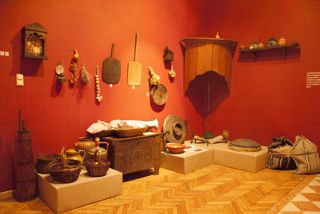Associate Professor Dr. Ana Luleva is head of the "Ethnology of socialism and post-socialism" section at the Institute of Ethnology and Folklore Studies with Ethnographic Museum at the Bulgarian Academy of  Sciences (BAS). She graduated from the Faculty of History, Sofia University "St. Kliment Ohridski" and specialized in History and Theory of Culture. After defending her PhD in the field of Bulgarian traditional material culture, she worked as a research associate at the Ethnographic Institute with Museum at BAS. She specialized in Munich and Jena, was a lecturer at South West University "Neofit Rilski" and guest lecturer at universities in Munich, Regensburg, Tartu and Istanbul. She is talking with Polina Spartyanova.
Sciences (BAS). She graduated from the Faculty of History, Sofia University "St. Kliment Ohridski" and specialized in History and Theory of Culture. After defending her PhD in the field of Bulgarian traditional material culture, she worked as a research associate at the Ethnographic Institute with Museum at BAS. She specialized in Munich and Jena, was a lecturer at South West University "Neofit Rilski" and guest lecturer at universities in Munich, Regensburg, Tartu and Istanbul. She is talking with Polina Spartyanova.
How would you describe the everyday culture of Bulgarians nowadays?
This is a very complex question. Assuming that "everyday culture" means a set of values, normative orientations and socially constructed meanings and patterns of behaviour that people, members of a social group, perceive as typical of their community and embody in their daily routines, it would be very difficult to talk about the everyday culture of Bulgarians in the singular. I think insteadwe are seeing today a complex constellation of everyday culture in a complex, open society with coexistent practices and worldviews of different nature, namely pre-modern, modern and post-modern. The culture of modern people combines, in a new, previously unfamiliar way, superstition and belief in magic and the evil eye, for example, with education and knowledge about the world.
 In your opinion, how has the everyday culture of socialism and post-socialism influenced the development of Bulgarian society?
In your opinion, how has the everyday culture of socialism and post-socialism influenced the development of Bulgarian society?
Undoubtedly, culture matters and affects the state of a social group or society as a whole. The work of ethnologists, cultural and social anthropologists is precisely to explore this relationship. The end of the communist regime did not put an end to the everyday culture established in its terms. A number of ideas and practices had proved to be viable and sustainable in the post-socialist period, thus affecting the process of post-socialist transformation.
Are there aspects of traditional Bulgarian culture which have recently become extinct and what are they?
Ethnologists use the term “Bulgarian traditional culture” to describe the pre-industrial culture of Bulgarian society. It is assumed that it was preserved in the Bulgarian village until the early twentieth century. The significant social changes after September 1944 led to the destruction of the former way of life and everyday culture. Bulgarian society was modernized, urbanized and the rural culture in the years of socialism was perceived as a remnant that should be overcome. Ethnographic expeditions in the second half of the twentieth century described the relics of the old traditional culture, thus reconstructing the picture of the traditional family and calendar holidays, traditional means of living, clothing, architecture, food, home arrangement, household goods. Nowadays, they are all part of the Bulgarian cultural heritage and are perceived as Bulgarian national traits.
 What are the specific characteristics of traditional and modern Bulgarian culture within the Slavic community and the Balkan Peninsula?
What are the specific characteristics of traditional and modern Bulgarian culture within the Slavic community and the Balkan Peninsula?
To determine the specific characteristics of a culture, it must be explored in comparison with other cultures, with close cultures that are within its cultural circle. For Bulgarian culture, those are the Balkans, Southeast Europe and Slavic cultures. The similarities and differences of Bulgarian culture with other Slavic cultures, with the culture of our neighbours, namely Romanians, Serbs, Greeks, Turks, are evident in specific pieces of research. There are numerous studies by Bulgarian and foreign scientists who made similar comparisons of material culture, funeral customs, calendar holidays, languages. On the other hand, it is important for ethnologists to understand which elements the bearers of the culture perceive as their "own" and which ones as "foreign", how they imagine their culture and that of others.
 Is there Greek heritage in the customs of Bulgarians and Bulgarian heritage in the lives of Greeks, and if so, what is it?
Is there Greek heritage in the customs of Bulgarians and Bulgarian heritage in the lives of Greeks, and if so, what is it?